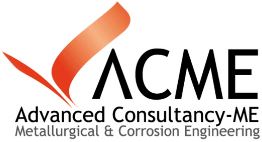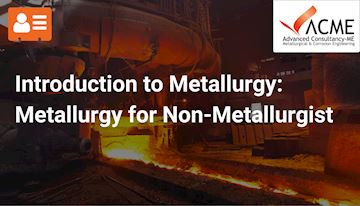Introduction to Metallurgy: Metallurgy for Non-Metallurgist
Introduction to Metallurgy: Metallurgy for Non-Metallurgist
-
Unlimited Team-wide Access
-
Advance Technical Competences
-
Courses by Industry Authorities
Additional
Quotation for your TeamAbout the course
Improving professional knowledge by understanding the principles of metallurgy provides participants with a set of valuable skills that can be applied in various industrial sections. Regardless of the field of work, having a fundamental knowledge of metallurgy can contribute to better decision-making, problem-solving, and collaboration with metallurgical experts.
Metallurgy for the Non-Metallurgist is a course designed to provide individuals with a non-metallurgical background a basic understanding of metallurgy, the study of metals and their properties. This course aims to bridge the knowledge gap and familiarize participants with fundamental concepts and principles of metallurgy, enabling them to make informed decisions and effectively collaborate with metallurgical professionals.
The course will also provide an overview of metals and alloys and relates these to the mechanical and physical characteristics of metals. Moreover, the training course will contain discussions on ferrous alloys (plain and alloy steels, stainless steels, and cast irons) and non-ferrous alloys, including corrosive and high-temperature applications, such as nickel-based alloys.
The course consists of 12 hours of live sessions with the instructor. All training content is provided through your EngineeringTrainer account.
Meet your instructor
Instructor
ACME
Materials Science, Metallurgy

Learning Outcomes
After this course, you...• understand the role and significance of metallurgy in industry,
• have a good overview of the different types of metals and their properties,
• have seen how metals are extracted from ores and refined, including purification techniques,
• know about metal heat treatment techniques such as annealing, quenching and tempering, and the effect on the microstructure and properties,
• have a good overview of the different metal forming techniques, their advantages and disadvantages, and for which applications each technique is typically used,
• know the concepts of common corrosion mechanisms, what are the drivers and which types of metals are susceptible.
Who should attend this course
• Individuals who may benefit from understanding the basic principles and concepts of metallurgy.• Starting engineers can use this course as a foundational resource to understand the principles of metallurgy.
Prerequisites
While this course on Metallurgy for Non• Metallurgists is designed to be accessible for individuals without prior knowledge or experience in metallurgy, having a basic understanding of materials science can be helpful.Program & Details
-
Introduction to Metallurgy
Live
1. Definition and significance of metallurgy
2. Role of metallurgy in various industries
3. Types of metals and their propertiesUpstream and downstream operations -
Extraction and Refining of Metals
Live
1. Processes involved in extracting metals from ores
2. Techniques used in refining metals and improving their purity
3. Overview of pyrometallurgy, hydrometallurgy, and electrometallurgy -
Properties of Metals
Live
1. Mechanical properties of metals (strength, hardness, toughness, ductility)
2. Chemical properties of metals and their reactivity -
Heat Treatment of Metals
Live
1. Importance of heat treatment in metallurgy
2. Different heat treatment processes and their effects on microstructure and properties of metals
3. Common heat treatment techniques: annealing, quenching, tempering, etc. -
Metal forming techniques
Live
1. Casting: Introduction to the casting process and its variations
2. Rolling: Understanding the rolling process and its applications
3. Forging: Overview of forging techniques and their advantages
4. Extrusion: Explanation of the extrusion process and its uses -
Corrosion and Protection of Metals
Live
1. Introduction to corrosion and its causes
2. Common types of corrosion and their effects on metals -
Applications of Metallurgy
Live
1. Exploring real-world applications of metallurgy in industries like aerospace, automotive, electronics, construction, and energy
2. Case studies highlight the role of metallurgy in specific applications.
Certification

Gain Access to the Course

Why choose EngineeringTrainer?
-
Unlimited Team-wide Access
-
Advance Technical Competences
-
Courses by Industry Authorities
Since using EngineeringTrainer our internal mentorship has a much more matured character.
Logan Chapman - COO at Chapman Consulting Inc.








